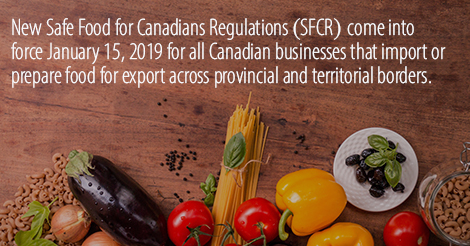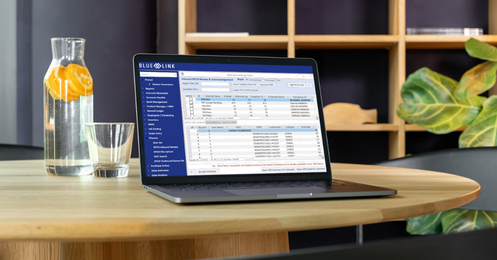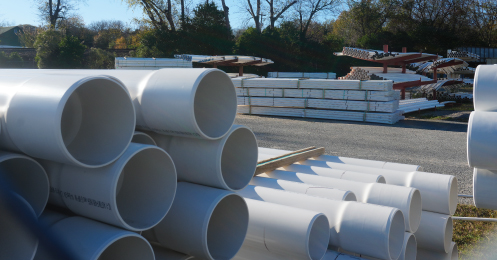Even though Canada is recognized for having one of the best food safety systems in the world, the Canadian Food Inspection Agency (CFIA) still receives an average of 2,000 reports from consumers concerning food safety issues every year. Significant improvements to food distribution supply chains, food production and the speed and volume of food manufacturing and transportation every year continue to provide government entities with food safety challenges. Add to this changing consumer preferences, food-based allergen concerns and healthy eating trends and you’re left with a complex and ever-changing food distribution network. To address the concerns of businesses and consumers alike, the CFIA and other regulatory entities have long since implemented standards for managing and tracking food production and distribution across Canada and the world. The latest in food safety regulations, known as The Safe Food for Canadians Regulations (SFCR) will come into force on January 15, 2019.
What is SFCR?
Similar to existing food regulations in Canada, the SFCR works to further protect Canadian consumers by putting a greater emphasis on proactively preventing risks to food safety and making it easier to quickly remove unsafe food from the supply chain. These regulations specifically target food imports and exports in Canada.
The ultimate goal of any food regulation is to give Canadian consumers peace of mind that the food on grocery shelves is safe to eat – whether those products are produced in Canada or abroad. With SFCR Canadian consumers can expect:
- Safer food on all grocery shelves
- More strict regulations targeting unsafe food practice's with a focus on proactive prevention
- Tougher penalties for activities and businesses that violate these regulations
- Greater control over imports into Canada
- More efficient and faster processes for managing recalls and removing unsafe food from the supply chain
For Canadian businesses in the food industry, these regulations will continue to strengthen Canada’s reputation for food safety and increase opportunities for exporting Canadian products worldwide.
The 3 Key Elements of SFCR
The SFCR applies to all businesses that import or prepare food for export across provincial and territorial borders and will help Canada’s food safety regulations become in line with international standards. The SFCR recognizes 3 key elements:
(1) Licensing
New licensing regulations require all food import companies to have a license from the CFIA. Licensing requirements apply to any business that conducts the following activities1:
- Import food or food products
- Manufacture, process, treat, preserve, grade, package, or label food for export or to be sent across provincial or territorial borders
- Export food (where an export certificate is requested)
- Slaughter food animals from which meat products are derived for export or to be sent across provincial or territorial borders
- Store and handle a meat product in its imported condition for inspection by the CFIA
The CFIA is making it easy for businesses to apply for a license online and will be phasing this requirement over a 12-30 month period depending on the food commodity, type of activity and business size.
(2) Preventive Controls
As a business that imports food products, it is imperative that you have preventive controls in place to ensure the food you import and sell is safe. This involves working closely with your foreign manufacturing and supply partners to understand and control the risks associated with importing their food products. More specifically, preventive controls require that all food import companies:
- Know the food that is imported in terms of biological, chemical and physical make-up and any associated hazards that pose a risk of contamination to the food.
- Be able to describe and clearly identify any potential risks and have a plan in place to control these risks.
- Know the foreign supply partners with which you do business – are your suppliers using safe methods for preparing, storing and transporting product? This includes making sure foreign suppliers are aware of allergens in Canada and are properly documenting and tracking their existence. Food import businesses need to be able to show that the foreign suppliers they work with are meeting the same food safety standards that are required by Canadian manufacturers.
- Identify and outline a written plan that dictates processes for meeting regulations.
(3) Traceability
Traceability is already an important part of the food distribution supply chain and requires businesses to trace where product comes from and to whom it is sold. This includes keeping detailed records of the food supply chain for each individual product and helps make the recall process easier by ensuring food is removed from the supply chain in the most efficient way possible.
Food Traceability Software
Food traceability software such as Blue Link ERP helps food import and distribution businesses comply with government regulations by managing and tracking inventory along the entire supply chain. As part of an all-in-one inventory and accounting system, Blue Link’s food traceability functionality provides specific features for tracking lot numbers and expiry dates and includes lot reporting features to better maintain product records and quickly identify affected inventory in the event of a product recall.
Blue Link’s lot tracking functionality aids businesses in achieving CFIA compliance and enables your business to track product end-to-end from your foreign or domestic supplier to your warehouse and then ultimately to your customer. This functionality works in conjunction with Blue Link’s inventory and accounting tools so that all business processes – sales through to invoicing, purchasing, shipping and receiving – are managed from a single database.
Next Steps
To best prepare for the upcoming SFCR in January 2019, start by doing an analysis of existing systems and processes. Does your business meet the specifications for needing a license? Do you have existing preventive controls in place for managing inventory and are you tracking product along the entire supply chain? How does your business manage product recalls? Consider finding a software solution designed for food import and distribution with traceability functionality as a way to help automate and manage these new requirements.
For additional information on the new SFCR we’ve included some resources below:
- 1Licensing: http://www.inspection.gc.ca/about-the-cfia/the-cfia-chronicle/special-edition-2018-/licensing/eng/1528488744086/1528488744335
- SFCR for Businesses: http://www.inspection.gc.ca/about-the-cfia/the-cfia-chronicle/special-edition-2018-/food-businesses/eng/1528486120649/1528486120899
- A Quick Look at the New SFCR [VIDEO]: http://www.inspection.gc.ca/food/sfcr/videos/importing-food-to-canada/eng/1528315408961/1528315409226










